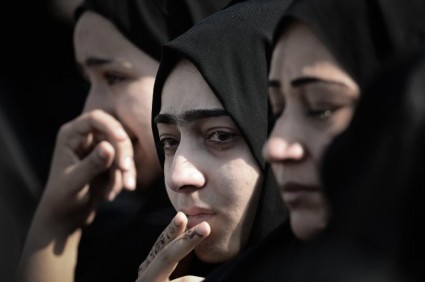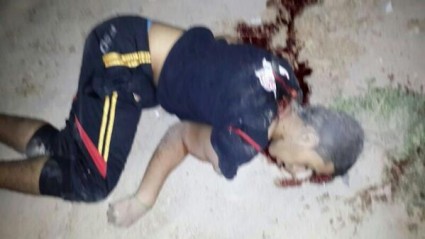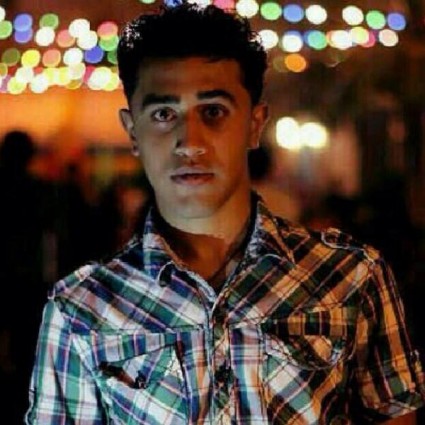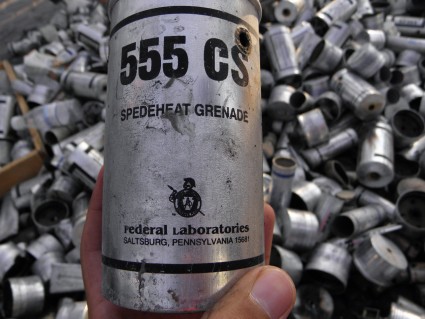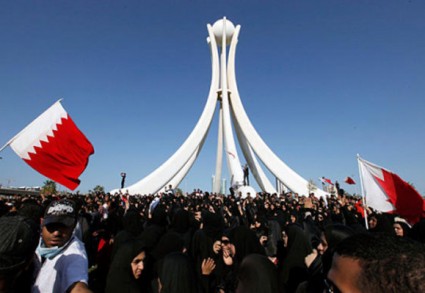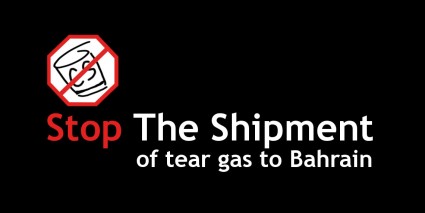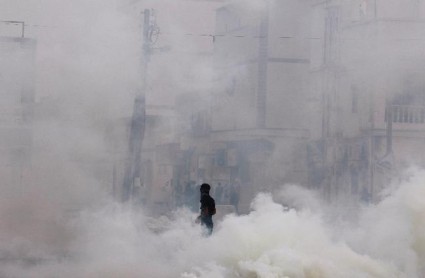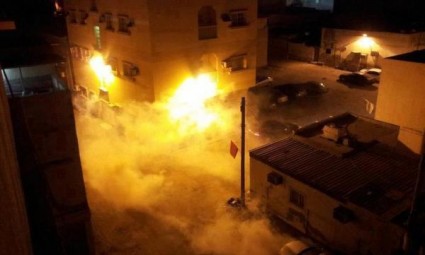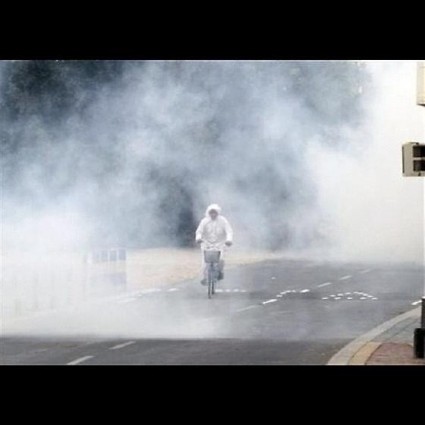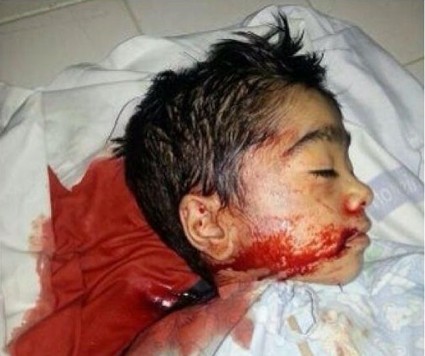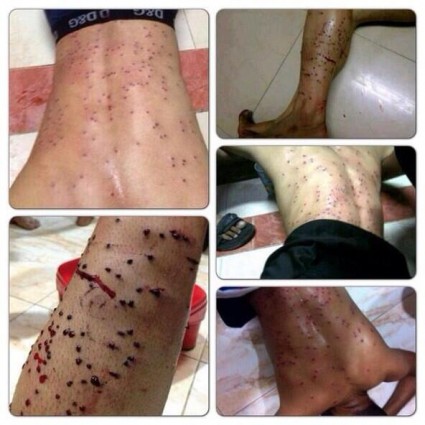Demonstrations Breakout on Word of Police Killing of 17 year old Ali Khalil AlSabag
October 22, 2013 No Comments
In Bahrain, “lives cheaper than car tires”
Leading activist: Bahraini lives “cheaper than car tires”
21 October, 2013 – Al Akhbar
An appellate court on Monday reduced to three years the prison sentence of a police officer convicted of killing the first martyr of Bahrain’s 2011 anti-government uprising, as three activists were handed five-year jail terms for burning tires at an “illegal gathering,” judicial sources and a human rights group said.
A Bahraini court originally sentenced the unnamed police officer in January to seven years in jail for fatally shooting 21-year-old Ali Musheime in the back on February 14, 2011 in the village of al-Daih during a “day of rage” rally which ignited a massive, pro-democracy rebellion against the Gulf island’s western-backed ruling family.
A second youth was killed the following day when police opened fire on Musheime’s funeral procession. Amnesty International said that “clear evidence” was present of “police brutality and excessive force” in those killings.
At least 87 more would be killed in the ensuing crackdown on dissidents, according to the Bahrain Center for Human Rights (BCHR).
The appellate court decided to reduce the policeman’s sentence after three fellow officers who witnessed Musheime’s killing claimed their colleague acted in “self-defense,” lawyers said.
The ruling comes as members of BCHR reported over Twitter that a separate court on Monday sentenced three protesters each to five years in prison for burning tires and taking part in an “illegal gathering.”
“Human lives in Bahrain [are] cheaper than car tires,” Maryam al-Khawaja, BCHR’s acting director, wrote on Twitter. …more
October 22, 2013 No Comments
Another Bahrain Police Murder – 17 Year Old, Ali Khalil AlSabag, with shot to head
17 Year Old, Ali Khalil AlSabag has been killed in more senseless Police Violence against Bahraini Citizens. As young Ali’s father went to see his son’s body, police have brutally beat and detained him. Outraged Citizens are marching in throughout Bahrain. 22 October, 2013
October 22, 2013 No Comments
Tear-gas shells replace the Pearl as the symbol of Bahrain
Tear-gas shells replace the Pearl as the symbol of Bahrain
Patrick Cockburn – 20 October, 2013 – PressTV
Two-and-a-half years ago the Bahrain government bulldozed the Pearl Monument, whose tall, graceful pillars held a giant pearl as a symbol of the island kingdom, because it had become the rallying point in the capital, Manama, for pro-democracy protesters. The authorities have never chosen a new symbol to replace the one they destroyed, but, if they do so, they might well like to consider the tear-gas shell or canister as best symbolising Bahrain as it is today. In keeping with this, the government has reportedly signed contracts with South Korean, German and South African firms for 1.6 million tear-gas shells of different calibres, giving it more than one projectile for every Bahraini citizen.
On every side there are signs of increased repression by the Sunni al-Khalifa royal family, which monopolises power in a country where Shia make up 60 per cent of the population. Between 2,400 and 3,000 people are in jail. In recent weeks, 50 Shia, including human-rights activists, were given up to 15 years in prison after the briefest of trials. Yousif al-Nashmi, allegedly tortured when detained by police, died in hospital soon after his release. The public prosecutor’s office said “the deceased was admitted to hospital on September 23 in a critical condition and was diagnosed with Aids”.
Two points have become clear during the 30 months since mass protests began on 14 February 2011: The protesters have not been cowed by persecution and the government has responded by turning Bahrain into a repressive police state. After tentative and unfulfilled promises of dialogue and reconciliation at the end of 2011, the monarchy reverted to reliance on force to crush the opposition. Significantly, the UN Special Rapporteur on Torture, Juan Mendez, has been twice denied entrance to Bahrain, most recently in April. A critic of the regime living in Bahrain, who did not want his name published, said that “over the last year torture has once again become the norm for anybody detained”.
Sensitivity to the degree to which Bahrain has apparently turned into an island of hate, with chasm-like divisions between rulers and ruled and between Sunni and Shia, was illustrated by the over-heated official reaction to President Obama’s reference to Bahrain in his speech to the UN General Assembly on 24 September. He had spoken mildly of “sectarian tensions that continue to surface in places like Iraq, Bahrain and Syria”, but Bahraini ministers queued up to deny that Bahrain had anything in common with Syria and Iraq. Interior Minister Sheikh Rashid bin Abdallah al-Khalifa, whose ministry is said to be importing industrial quantities of tear gas, said Bahrain had “never witnessed at any time sectarian tensions”. The Foreign Minister, Sheikh Khaled bin Ahmed al-Khalifa, claimed that the kingdom had fostered a culture of tolerance between different communities. He added that “what is occurring in Bahrain… is a concerted effort by terrorist extremist groups to target security personnel and expatriates with the intent of spreading fear and division”.
As with many authoritarian regimes over the centuries, the Bahraini government might find it difficult to ease repression even if it wanted to. The fears of the Bahraini Sunni community have been stoked by claims of the existence of terrorist plots inspired by Iran in support of its fellow Shia. But an independent inquiry led by the US-Egyptian legal authority, Cherif Bassiouni, on how Bahrain handled the unrest in 2011, found no evidence of Iranian involvement. Allegations of revolutionary intentions become self-fulfilling: Moderate bloggers and civil-rights activists who have been mistreated and given long sentences tend to be less moderate when they get out of jail.
Why have the al-Khalifas stepped up their efforts to crush the opposition over the summer? One reason is probably sheer frustration that 30 months after the first demonstrations at the Pearl Roundabout, protesters in Shia villages still confront police and hold marches. There is also an exaggerated perception in Bahrain – as in Saudi Arabia and in the other Gulf monarchies – that American power in the Middle East has declined more sharply than in fact it has. Thus the authorities felt free to arrest a prominent opposition leader, Khalil al-Marzouq, the Assistant Secretary General of al-Wefaq, the main opposition party, on 17 September. The opposition had hoped their leaders might enjoy limited protection because their detention would annoy Washington and Western Europe.
October 22, 2013 No Comments
South Korea Embassy in London See Protests Against CS Gas to Bahrain
South Korea rapped for selling arms to Bahrain
19 October, 2013 – PressTV
Protesters outside the South Korean Embassy in London have called on Seoul to stop shipments of tear gas to Bahrain.
The demonstration by the Campaign Against Arms Trade (CAAT) and free Bahrainis was held at South Korea’s diplomatic mission in the British capital on Friday, October 18.
Protesters carrying Bahraini flags and photograph of tear gas injuries, condemned South Korea’s export of riot control equipment to Bahrain’s Al Khalifa regime while it faces accusations of human rights violations.
Some demonstrators were wearing gas masks and others held tear gas canisters. They were also carrying banners reading, “Tear gas kills” and “Stop the shipment.”
Earlier this week, Bahrain Watch, an independent human rights group, published a document dating back to July and allegedly showing Bahrain’s Interior Ministry plans to import 1.6 million tear gas canisters and some 90,000 tear gas grenades.
“I think if you look at the scale and frequency of the use of tear gas in Bahrain, it’s unprecedented anywhere in the world,” said Alaa Shehabi, a founding member of Bahrain Watch.
Since mid-February 2011, thousands of pro-democracy protesters have staged numerous demonstrations in the streets of Bahrain, calling for the Al Khalifa family to relinquish power. The protests have been met with a heavy-handed crackdown.
Physicians for Human Rights say doctors and nurses have been detained, tortured, or disappeared because they have “evidence of atrocities committed by the authorities, security forces, and riot police” in the crackdown on anti-government protesters. …source
October 22, 2013 No Comments
Iran has Economic leverage to Demand Stop S. Korea from Exporting CS Gas to Bahrain
South Korea’s Sep Iranian crude imports double from Aug to 137,467 b/d
Platts – 22 October, 2013
South Korea’s imports of Iranian crude oil in September more than doubled from the previous month to 4.12 million barrels, or 137,467 b/d, compared with 1.97 million barrels in August, data released by state-owned Korea National Oil Corp. showed Tuesday.
The country had no crude imports from Iran in August and September last year in line with US-led sanctions on Iran.
“Crude imports from Iran increased in September compared with the previous month, but total volume imported for the first nine months was down on a yearly basis,” a KNOC official said.
From January to September, South Korea imported 37.28 million barrels of crude from Iran, down 3.8% from 38.77 million barrels in the same period last year.
South Korea was granted a 180-day exemption from US financial sanctions since last year allowing it to keep buying Iranian crude oil as long as it showed an effort to reduce reliance on the supplies.
The country imported 56.15 million barrels of Iranian crude in 2012, down 35.6% from 87.18 million barrels in 2011.
South Korea’s total crude oil imports in September fell 6.4% year on year to 74.75 million barrels, or 2.49 million b/d, compared with 79.85 million barrels in the same month last year.
Meanwhile, South Korea’s oil consumption slipped 4% year on year to 64.59 million barrels, or 2.15 million b/d, in September, from 67.30 million barrels a year earlier.
Oil demand in September was down 7.3% from 69.70 million in August. The country’s refined product exports in September plunged 20.6% year on year to 35.66 million barrels, equivalent to 1.19 million b/d, from 44.93 million barrels a year earlier.
The September exports represented a fall of 3.4% from 36.94 million barrels in August.
South Korea imported 24.71 million barrels of oil products, or 823,667 b/d, in September, down 17.5% from 29.95 million barrels in the same month last year.
September imports were 4% lower from the 25.73 million barrels in August. …source
October 22, 2013 No Comments
Bahrain imports chemical and tear gases twice the population
Bahrain: Imported chemical and tear gases twice the population
By davidswanson – 18 October, 2013 – warisacrime.org
Bahrain’s Ministry of Interior is planning to import 1.6 million tear gas canisters and 90,000 tear gas grenades, according to a leaked document, published Wednesday 17th October by research and advocacy group Bahrain Watch. The document — apparently a tender issued by the Ministry of Interior’s Purchasing Directorate — shows that Bahrain’s security forces are stockpiling massive amounts of tear gas, despite serious concerns of international NGOs and the United Nations Human Rights Council. These groups have called Bahrain’s use of tear gas “unnecessary and indiscriminate”, and “lethal”. This planned new shipment will supply Bahrain with more tear gas canisters than the entire population of the country. Efforts are underway to challenge this massive deal which has confirmed what the opposition had claimed; the Alkalifa are there to kill, maim and torture as many Bahrainis as possible.
The ferocity of repression was laid bare in recent days. Yesterday regime’s security forces attacked peaceful protests in many areas causing serious injuries. The intensification of repressive attacks by those forces are desperate measures to stem the deepening political and humanitarian crisis engulfing the country. At the end of the three-days mourning of last weeks’ martyr, Yousuf Al Nashmi, 31, at Al Musalla Town, the funeral service was attacked by regime’s forces using chemical and tear gases and shotguns against participants. A young man from Karzakkan Town received a direct hit fired by the police using shotguns. He has been admitted to intensive care as his condition remains critical. He suffers broken skull and severe internal bleeding.
Many Bahraini youth have been detained in the past week. Among them is Mohammad Al Nashaba, 21 who was snatched from his house in the early hours of the Eid Day, Tuesday 15th October. Another youth, Jaffar Al Wada’ei, 19, was also snatched from his home and taken to Alkhalifa torture dungeons.
On 14th October, Foreign Policy website has published an article titled “Ignoring Bahrain’s iron fist”. It was written by Sarah Margon, acting Washington director at Human Rights Watch and Mary Laurie, a fellow in the Human Rights Watch Washington office. It said: “For two years, as the United States has condemned massive abuses of protesters throughout the Middle East, it has largely turned a blind eye to equally horrific treatment in Bahrain, a small but significant ally. As the situation in Manama shows no sign of abating, the United States needs to step up its game — before it’s too late.” After detailing America’s stands on Bahrain in the past two years including what President Obama said in his address at the UN recently, it concluded: “If the United States is trying to gain leverage with Bahrain’s rulers by limiting its criticism, there is no evidence that this app roach is making a difference. In fact, it appears to be making a bad situation worse.”
Although the regime’s forces are committing atrocious crimes against Bahrainis every day, only a portion of those crimes are documented. The link below shows how those forces are waging war against Bahraini natives. The crime which has been recorded took place at Al Ekr Town. Those forces prefer to commit their crimes on the secluded roofs of houses they raid without legal permission. A similar video was broadcast about a similar crime at Alaker Town last year.
Meanwhile, the protests have continued in most parts of the country under different mottos. The regime’s failure to contain the situation or defeat the Revolution has taken the struggle steps ahead and created more pressure on Alkhalifa’s allies especially Washington. The protest on Tuesday to mark the end of the commemoration service of Martyr Yousuf Al Nashmi, has proven beyond doubt that the people are clear in their minds about what they want, and possess power and carriage to counter the regime’s mouthpieces. …source
October 22, 2013 No Comments
STOP THE SHIPMENT – NO MORE CS GAS TO BAHRAIN
Bahrain’s Ministry of Interior is planning to import 1.6 million tear gas canisters and 90,000 tear gas grenades, according to a leaked document, published today by research and advocacy group Bahrain Watch. The document — apparently a tender issued by the Ministry of Interior’s Purchasing Directorate — shows that Bahrain’s security forces are stockpiling massive amounts of tear gas, despite serious concerns of international NGOs and the United Nations Human Rights Council. These groups have called Bahrain’s use of tear gas “unnecessary and indiscriminate”, and “lethal”. This planned new shipment will supply Bahrain with more tear gas canisters than the entire population of the country. …more
October 22, 2013 No Comments
Stop the Killing and Abuse with CS Gas by US “friends and partners” in Bahrain
Activists urge Korea to cancel massive tear gas shipment to Bahrain
18 October, 2013 – Al Akhbar
Rights activists have launched a campaign urging South Korea to cancel an imminent shipment of over 1.6 million tear gas canisters allegedly ordered by Bahraini authorities battling a two-and-a-half-year-long rebellion.
An unverified document dated June 16, 2013 obtained this week by the monitoring group Bahrain Watch shows that Bahrain’s Ministry of Interior has requested an order of 1.6 million tear gas shells, 145,000 stun and flash grenades, and 90,000 tear gas grenades.
The massive figure startled observers who pointed out that the quantity was larger than the entire 1.2 million population of Bahrain, half of which is comprised of foreigners and migrant workers not involved in the largely-peaceful, anti-government movement.
“I think if you look at the scale and frequency of the use of tear gas in Bahrain, it’s unprecedented anywhere in the world,” Alaa Shehabi, a founding member of Bahrain Watch which is behind the Stop the Shipment campaign, told Al-Akhbar.
“They (police) are using hundreds of rounds on a nightly basis, … so they need this amount to sustain the constant state of repression.”
Shehabi added that her group has received information that the order is expected to be delivered before the end of this month.
“We’ve had, in the last 24 hours since we launched the campaign, 11,000 e-mails sent to Korean agencies involved in shipment,” Shehabi said.
Heeding activists’ calls, the Korean Confederation of Trade Unions have condemned the tear gas deal and urged authorities to prevent the shipment, citing humanitarian concerns.
The procurement tender does not specify the supplier of the weapons, but activists say that the bulk of the tear gas that reaches the tiny Gulf island is manufactured by two South Korean companies and a joint German-South African one.
Rheinmetall Denel Munition, the German-South African company, and South Korea’s Defense Acquisition Program Administration both declined to comment on the alleged deal.
Police have killed at least 89 people since the anti-government uprising erupted in February 2011, according to the Bahrain Center for Human Rights. Of those victims, 39 died from tear-gas related attacks including suffocation and direct shots to the head, records from Physicians for Human Rights show.
Authorities have so far been unable to quell the nearly daily demonstrations that persist across Bahraini villages against the widely-detested, US-backed monarchy. Dozens of human rights activists, doctors and political opponents have been jailed since the start of the uprising.
Over the past month alone, Bahrain sentenced 104 protest leaders to prison terms of up to 15 years on “terrorism” related charges. …source
October 22, 2013 No Comments
Bahrain’s Widespread Abuse includes use of Birdshot Against Village Protesters
October 22, 2013 No Comments
Night raids, torture, rampant gassing, sham trials a daily reality in Bahrain
October 22, 2013 No Comments
Clouds of Death – Story of Chemical Gassing and Collective Punishment in Bahrain
THE UNITED STATES ONGOING SUPPORT FOR THE BLOODY BAHRAIN REGIME AND FAILURE TO ACT AGAINST ITS ONGOING SYSTEMATIC HUMAN RIGHTS ABUSE IS NOT ONLY SHAMEFUL HYPOCRISY, IT IS CRIMINAL CONSPIRACY.
March, 2013
Recent events in Bahrain reveal an abuse of CS Gas being used at levels beyond any rational means of crowd or riot control”. The Regime’s deliberate, lethal misuse and abuse of CS GAS is Criminal and Genocidal toward the Majority Shia Population in Bahrain. The Bahrain MOI is responsible for directing the abuse of CS Gas at levels designed to inflict death and long term injury to the individual and genetic health of innocent people who inhabit Bahrain’s Villages. Meanwhile the United States’ and United Kingdom’s only Action Against their Brutal ALLY is an occasional, vain utterance about Regime Abuses. Today they again stand silent while their Ally, South Korea exports more CS Gas canister to Bahrain than there are Citizens to Poison.
MR. CAMERON AND MR. OBAMA, WE HAVE GROWN TIED OF YOUR LIES AND SUPPORT FOR THE AL KHALIFA REGIME IN BAHRAIN. YOUR CONTINUED SILENCE AND YOUR FAILURE TO ACT WITH GENUINE MEASURE TO STOP THE HUMAN CRUELTY FROM THE AL KHALIFA REGIME IS COMPLICITY.
October 22, 2013 No Comments
Bahrain Regime Desperately needs a new Approach to “Reform Dialogue”
October 22, 2013 No Comments
On the Occasion of the Assassination of 20 Year Old, Hussein Mahdi Habib
Opposition Activist Martyred by Regime Forces in Bahrain
20 October, 2013 – Al Manar
The regime forces in Bahrain killed a new opposition activist as he was demanding freedom and political as well as social reform.
Hussein Mahdi Habib, 20, hails from Sitra Island, northeastern Bahrain.
Habib, who had been already sentenced in absentia to 15 years, was shot dead by the regime forces.
People have taken to the streets in the Bahrain’s northeastern island to stage a demonstration against the al-Khalifa regime.
The protesters shouted anti-regime slogans and called for the freedom of political prisoners in the tiny Gulf country.Sheikh Salman
The Secretary General of the Bahraini prominent opposition group, al-Wefaq, Sheikh Salman, slammed the regime for its consistence rejection to start a serious national dialogue.
“Manama authorities believe in stifling the Bahrainis.”
Sheikh Salman also called on wide participation in the humanitarian campaign to prevent importing the tear gas bombs from North Korea.
Arab and Western newspapers mentioned that Bahrain marks the highest international rates of using such bombs against the Bahrainis who seek democracy and freedom in their country. …source
October 22, 2013 No Comments
The Unabated, Dispicable System of Human Rigths Abuse in Saudi Arabia
Saudi Arabia- International spotlight shows broken human rights promises as oppression and violations continue
22 October, 2013 – Gulf Center for Human Rights
Saudi Arabia has failed to deliver on promises it made to the international community. In 2009 Saudi Arabia pledged to implement recommendations made at its Universal Periodic Review (UPR) in relation to its human rights record. At its second UPR, which took place in Geneva on 21 October 2013, Saudi Arabia failed to show that it had implemented or taken steps to implement the recommendations. On the contrary a crackdown continues across the country against those demanding that their human rights be respected.
Citizens continue to be deprived of their basic human rights and human rights defenders and their families continue to be targeted as a result of their human rights work. Many face a myriad of violations including arbitrary arrest and detention, torture, travel bans, judicial harassment and unfair trials. Alleged counter-terrorism measures are being increasingly used as a tool to arrest human rights defenders. Furthermore, civil society has been faced with a renewed crackdown over the past two years and impunity for human rights violations is increasing. For further information see Gulf Centre for Human Rights (GCHR) appeals on Saudi Arabia. (http://gc4hr.org/news/index/country/3)
Women continue to be discriminated against in Saudi Arabia. The GCHR issued an appeal on 17 October 2013, as authorities are targeting those campaigning for the right of women to drive. The GCHR fully supports the “26 October Campaign”, which designates the 26 October as a day for women to drive. (http://gc4hr.org/news/view/504)
Failure to implement the UPR recommendations marks a pattern of behaviour by Saudi Arabia, which has shown a persistent lack of cooperation and respect for UN mechanisms. On 18 October 2013 it declined a non-permanent seat on the UN Security Council on the basis that the body had failed in its duties to act in conflicts including that taking place in Syria. This move has been viewed as ironic by human rights organisations. Furthermore Saudi Arabia has yet to sign and ratify core UN human rights treaties and agreements such as the International Covenant on Civil and Political Rights, the International Covenant on Economic, Social, and Cultural Rights, the International Convention on the Elimination of All Forms of Racial Discrimination, and the Convention on the Protection of the Rights of All Migrant Workers and Members of Their Families. It has also refused to allow visits by seven UN Special Rapporteurs since 2009.
In 2013, many prominent human rights defenders have been convicted on broad charges following unfair trials. In March, two founders of the prominent Saudi Civil and Political Rights Organisation (ACPRA), Abdullah Al-Hamid and Mohammed Al-Qahtani, were sentenced to 10 and 11 years respectively due to posts they made on Twitter promoting human rights and the organisation was dissolved. They were found guilty of “breaking allegiance and disobeying the ruler”, “undermining unity”, “questioning the integrity of officials”, “seeking to disrupt security” and “inciting disorder by calling for demonstrations”. Others convicted on such broad charges this year include Mikhlif Al-Shammari, Wajeha Al-Huwaider, Fouzia Al-Oyuni, Raef Badawi, Mohammed Al -Bajady and Sulaiman Al-Rashudi. Saudi courts are currently trying others, including the human rights lawyer Waleed Abu al-Khair, on similar charges while others continue to face harassment and travel bans. …more
October 22, 2013 No Comments

